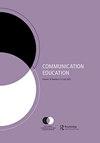Teaching God’s design: exploring the rhetorical and relational goals of evangelical leaders during premarital education about sex
IF 0.8
Q3 COMMUNICATION
引用次数: 0
Abstract
ABSTRACTThis study sought to advance the growing body of research on communication and instruction outside of the college classroom by exploring the rhetorical and relational goals of religious leaders facilitating premarital education about sex (i.e., sexuality, sexual health, and intimacy). Specifically, 47 evangelical Christians who had taught premarital education content (e.g., counseling, courses, and retreats) completed open-ended surveys regarding their goals when communicating about sex and the challenges or barriers to accomplishing their goals. Follow-up interviews were conducted with 16 of the 47 participants about their experiences with the topic. A thematic analysis revealed that participants sought to counter myths and misconceptions, teach the emotional–spiritual and redirect the physical, and create a safe space. Moreover, the challenges they experienced included (couples’) discomfort, limited time and expertise, and perceived conflicting teacher–student goals. In all, their efforts to teach “God’s design” and the challenges they perceived were filtered through their Christian ideology, indicating the need to continue exploring the role of social identity in teaching–learning contexts.KEYWORDS: rhetorical and relational goalsreligionsexual educationinstructional communication Disclosure statementNo potential conflict of interest was reported by the author(s).教导神的设计:探索福音派领袖在婚前性教育中的修辞和关系目标
摘要本研究旨在通过探讨宗教领袖促进婚前性教育(即性行为、性健康和亲密关系)的修辞和关系目标,推动大学课堂外的交流和教学研究的发展。具体来说,47位曾教授婚前教育内容(如咨询、课程和静修)的福音派基督徒完成了关于他们在性交流时的目标以及实现目标的挑战或障碍的开放式调查。对47名参与者中的16名进行了后续采访,询问他们对该主题的体验。一项专题分析显示,参与者试图反驳神话和误解,教授情感和精神,重新引导身体,并创造一个安全的空间。此外,他们所经历的挑战包括(夫妻)的不适,有限的时间和专业知识,以及相互冲突的师生目标。总之,他们教授“上帝的设计”的努力和他们所感受到的挑战都是通过他们的基督教意识形态过滤出来的,这表明有必要继续探索社会身份在教与学环境中的作用。关键词:修辞和关系目标;宗教;性教育;教学交流;披露声明作者未报告潜在的利益冲突。
本文章由计算机程序翻译,如有差异,请以英文原文为准。
求助全文
约1分钟内获得全文
求助全文
来源期刊

COMMUNICATION EDUCATION
EDUCATION & EDUCATIONAL RESEARCH-
CiteScore
3.10
自引率
34.80%
发文量
47
期刊介绍:
Communication Education is a peer-reviewed publication of the National Communication Association. Communication Education publishes original scholarship that advances understanding of the role of communication in the teaching and learning process in diverse spaces, structures, and interactions, within and outside of academia. Communication Education welcomes scholarship from diverse perspectives and methodologies, including quantitative, qualitative, and critical/textual approaches. All submissions must be methodologically rigorous and theoretically grounded and geared toward advancing knowledge production in communication, teaching, and learning. Scholarship in Communication Education addresses the intersections of communication, teaching, and learning related to topics and contexts that include but are not limited to: • student/teacher relationships • student/teacher characteristics • student/teacher identity construction • student learning outcomes • student engagement • diversity, inclusion, and difference • social justice • instructional technology/social media • the basic communication course • service learning • communication across the curriculum • communication instruction in business and the professions • communication instruction in civic arenas In addition to articles, the journal will publish occasional scholarly exchanges on topics related to communication, teaching, and learning, such as: • Analytic review articles: agenda-setting pieces including examinations of key questions about the field • Forum essays: themed pieces for dialogue or debate on current communication, teaching, and learning issues
 求助内容:
求助内容: 应助结果提醒方式:
应助结果提醒方式:


